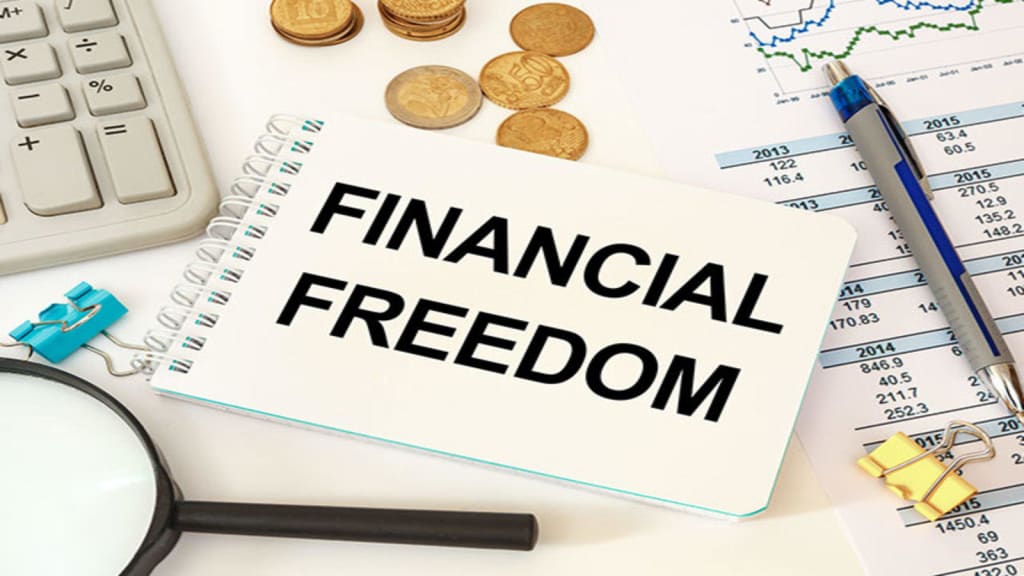Achieving Financial Freedom
A Journey to Independence and Security

Financial freedom is a goal that resonates with many individuals, representing a state of having sufficient financial resources to live comfortably without the constant stress of money-related concerns. It means having the ability to make life decisions without being overly constrained by financial pressures. However, achieving financial freedom requires discipline, planning, and a strategic approach to managing and growing one’s finances. This article will explore the concept of financial freedom, outline steps to achieve it, and discuss the benefits of reaching this desired state.
Understanding Financial Freedom
Financial freedom is not just about accumulating wealth; it is about having the resources to live life on your own terms. It means having enough savings, investments, and cash flow to afford the lifestyle you want for yourself and your family. It also involves the ability to retire or pursue a career you are passionate about without being solely driven by salary.
Achieving financial freedom is different for everyone because it depends on individual goals, values, and lifestyle choices. For some, it might mean traveling the world, while for others, it might mean having the ability to start their own business or retire early. Regardless of the specifics, the underlying principle is the same: financial security and independence.
Steps to Achieve Financial Freedom
Set Clear Financial Goals
The first step towards financial freedom is setting clear and achievable financial goals. This involves defining what financial freedom means to you and outlining the steps needed to get there. Goals should be specific, measurable, attainable, relevant, and time-bound (SMART). Whether it's paying off debt, saving for a down payment on a house, or building an investment portfolio, having clear goals will provide direction and motivation.
Create a Budget and Stick to It
Budgeting is a fundamental aspect of financial management. A well-planned budget helps track income and expenses, ensuring that you live within your means. It allows you to allocate funds to various categories, such as savings, investments, and discretionary spending. By sticking to a budget, you can avoid unnecessary expenses and increase your savings over time.
Build an Emergency Fund
An emergency fund is crucial for financial stability. It acts as a safety net, covering unexpected expenses such as medical bills, car repairs, or job loss. Ideally, an emergency fund should cover three to six months' worth of living expenses. Having this fund in place prevents you from dipping into savings or going into debt during unforeseen circumstances.
Pay Off Debt
Debt can be a significant barrier to financial freedom. High-interest debts, such as credit card debt, can quickly accumulate and become unmanageable. Prioritize paying off debt by focusing on high-interest loans first while making minimum payments on others. Consider using methods like the debt snowball or avalanche techniques to systematically reduce and eliminate debt.
Invest Wisely
Investing is a powerful tool for building wealth over time. While saving money is essential, investing allows your money to grow through compounding returns. Diversify your investment portfolio by including a mix of stocks, bonds, real estate, and other assets. It's crucial to educate yourself about different investment options and seek advice from financial advisors if needed.
Maximize Income Sources
Relying on a single source of income can be risky. Explore opportunities to increase your income through side hustles, freelance work, or passive income streams. Diversifying income sources not only boosts your earning potential but also provides financial security in case one source of income is disrupted.
Save for Retirement
Planning for retirement is a critical component of financial freedom. Start saving for retirement as early as possible to take advantage of compound interest. Contribute to retirement accounts such as 401(k)s or IRAs, and consider employer-matching contributions if available. Having a robust retirement plan ensures that you can maintain your lifestyle and financial independence in your later years.
Continuously Educate Yourself
Financial literacy is key to making informed decisions. Continuously educate yourself about personal finance, investment strategies, and economic trends. Attend workshops, read books, and follow reputable financial blogs and podcasts. The more knowledgeable you are, the better equipped you will be to manage your finances effectively.
Benefits of Achieving Financial Freedom
Reduced Stress and Anxiety
Financial stress can take a significant toll on mental and physical health. Achieving financial freedom alleviates the constant worry about money, leading to improved well-being and a higher quality of life.
Increased Flexibility and Choices
Financial freedom provides the flexibility to make life choices that align with your values and passions. Whether it's pursuing a dream job, traveling, or spending more time with family, having financial security allows you to make decisions based on what truly matters to you.
Security and Stability
Having financial resources and an emergency fund provides a safety net during challenging times. It ensures that you can handle unexpected expenses and maintain stability even in the face of economic downturns or personal emergencies.
Ability to Pursue Passions and Hobbies
When you're not constantly worried about money, you have the freedom to explore hobbies, interests, and passions. Financial freedom allows you to invest time and resources into activities that bring joy and fulfillment.
Legacy Building
Financial freedom enables you to plan for the future and create a legacy for your loved ones. Whether it's providing for your children's education, supporting charitable causes, or leaving an inheritance, being financially secure allows you to make a lasting impact.
Conclusion
Achieving financial freedom is a journey that requires discipline, planning, and continuous effort. By setting clear financial goals, creating a budget, building an emergency fund, paying off debt, investing wisely, maximizing income sources, saving for retirement, and continuously educating yourself, you can pave the way towards financial independence and security.
The benefits of financial freedom extend beyond financial stability. It reduces stress, increases flexibility, provides security, allows you to pursue passions, and enables legacy building. Ultimately, financial freedom empowers you to live life on your own terms, making choices that align with your values and aspirations. Start your journey towards financial freedom today, and take control of your financial future.
About the Creator
Enjoyed the story? Support the Creator.
Subscribe for free to receive all their stories in your feed. You could also pledge your support or give them a one-off tip, letting them know you appreciate their work.





Comments (1)
"Money is essential for everyone, but true wealth lies in kindness and emotions. Money buys conveniences, not happiness or genuine relationships. to learn about managing money wisely and cherish what truly matters. Real wealth is in a full heart."Visit www.big.salary7.com